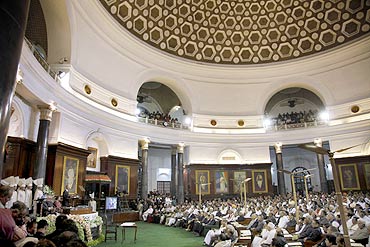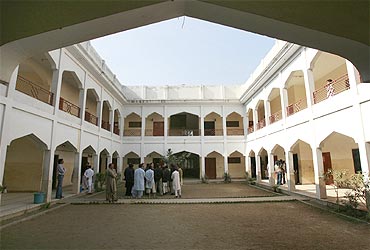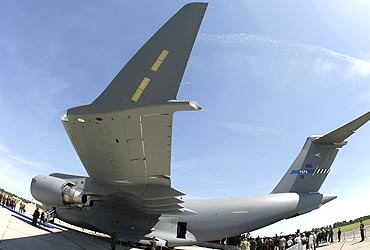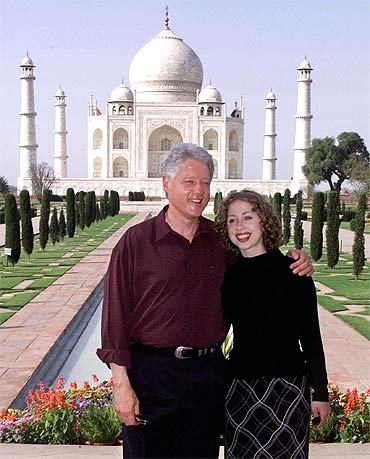Photographs: Jason Reed/Reuters
An influential Republican lawmaker has vowed to hold United States President Barack Obama's feet to the fire regarding his pledge during his address to the Parliament to pressure Pakistan to dismantle terrorist havens within its borders that foment attacks against India.
United States Representative Ed Royce, a ranking member of the powerful House Foreign Affairs Committee, said, "It was only after the Indian media's withering criticism that he hadn't mentioned Pakistan's complicity that moved him to at the end of his visit -- and not until the end of his visit -- to recalibrate his remarks in Mumbai and to offer a clear message during his speech in Delhi to Pakistan's leadership that those responsible for Mumbai (terror attacks), must be brought to justice."
Reportage: Aziz Haniffa in Washington, DC
'The whitewash didn't play well with the hosts'
Image: Obama addresses members of ParliamentPhotographs: Jason Reed/Reuters
In his blog post on November 8, Royce had said, "In commemorating the 26/11 terror attacks, Obama didn't utter the word 'P'. The whitewash didn't play well with the hosts. Later in the trip, Indian Prime Minister (Manmohan) Singh called Pakistan a 'terror machine' while Obama avoided criticism."
"It's clear," Royce, who is also the GOP co-chair of the Congressional Caucus on India and Indian Americans, told rediff.com, "that the United States is not approaching the LeT (Lashkar-e-Tayiba, the Pakistan-based terror outfit responsible for 26/11 terror attacks) with the same urgency as Al Qaeda. That should change, given the increasing potency of this Pakistan-based Jihadi group."
'Put actions behind these words'
Image: A school owned by Jamaat-ud-Dawa in MuridkePhotographs: Mohsin Raza/Reuters
Now that Obama had made this pledge to India, Royce said, "He should put actions behind these words. And whether he will, is the question. We will only know the policy has changed when we take the LeT as seriously as Al Qaeda -- because it is at heart the same terrorist group. Because public declarations are one thing, but implementation and putting words into action is another."
He added, "I will be helping to drive policy, as will the India Caucus, on targeting the LeT and on leveraging more pressure on the government of Pakistan to close down the campuses from which the LeT operate and train the next generation of Jihadi, as well as the Deobandi schools in Pakistan, of which there are over 800 that are particularly problematic. We need a concerted effort to not only close these Deobandi schools but also the other campuses in Muridke (in Pakistan occupied Kashmir) that are training young people in the art of terror in plain open sight. They have to be closed down by the government of Pakistan, and the (US) administration has to make sure it happens."
'It might be the best India can hope for'
Image: The first C-17 transport aircraftPhotographs: Mohsin Raza/Reuters
On Obama endorsing India's candidacy for a permanent United Nations Security Council seat, Royce acknowledged "it was a strong endorsement." He added, "Realistically though, it might be the best India can hope for, with China likely to oppose India moving up at all."
Royce said the new Republican-controlled House would focus more on increasing trade with India, and alleged that "the Democratic-controlled House was very hostile to any trade advances."
The lawmaker also said he would continue to push for more defence deals between the US and India. While lauding the $5-billion-plus Boeing C-17 deal, he said a top priority would be to impress upon the administration to continue with its sustained efforts to prevail upon India to seriously consider purchasing the 126 multi-role combat aircraft -- in a deal that could be worth over $11 billion -- from American companies.
'The administration didn't reach out to the Congress'
Image: US President Bill Clinton with daughter Chelsea at the Taj Mahal during his visit in 2000Photographs: Reuters
"If the US-India relationship is to become a defining partnership of the 21st century," Royce said, "active defence cooperation between the two countries is a must."
He complained that "the administration didn't reach out to the Congress about this trip or India policy much at all. And, I am contrasting that to President Clinton. President Clinton brought members of Congress when he went to India, including me, and in not doing so is a missed opportunity to build bipartisan support for critical issues affecting the US-India relationship, including trade."






article